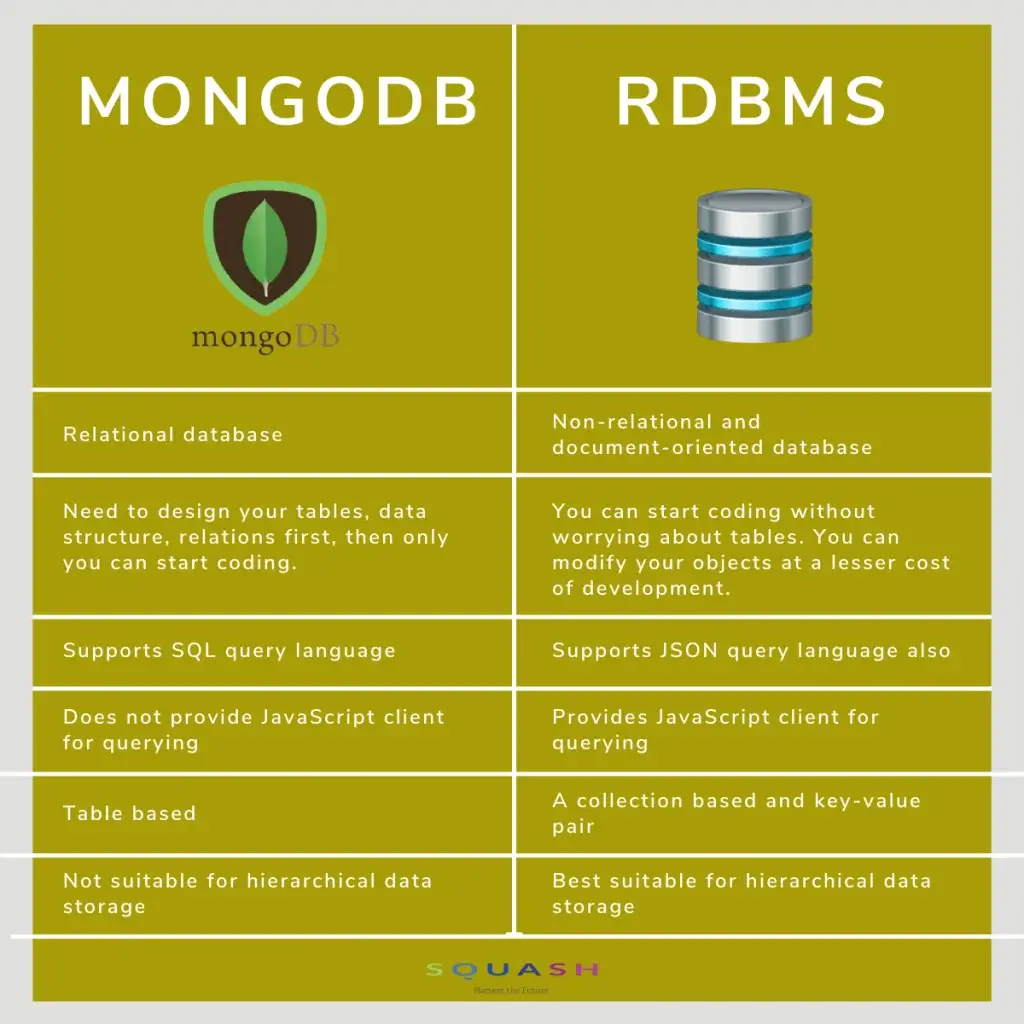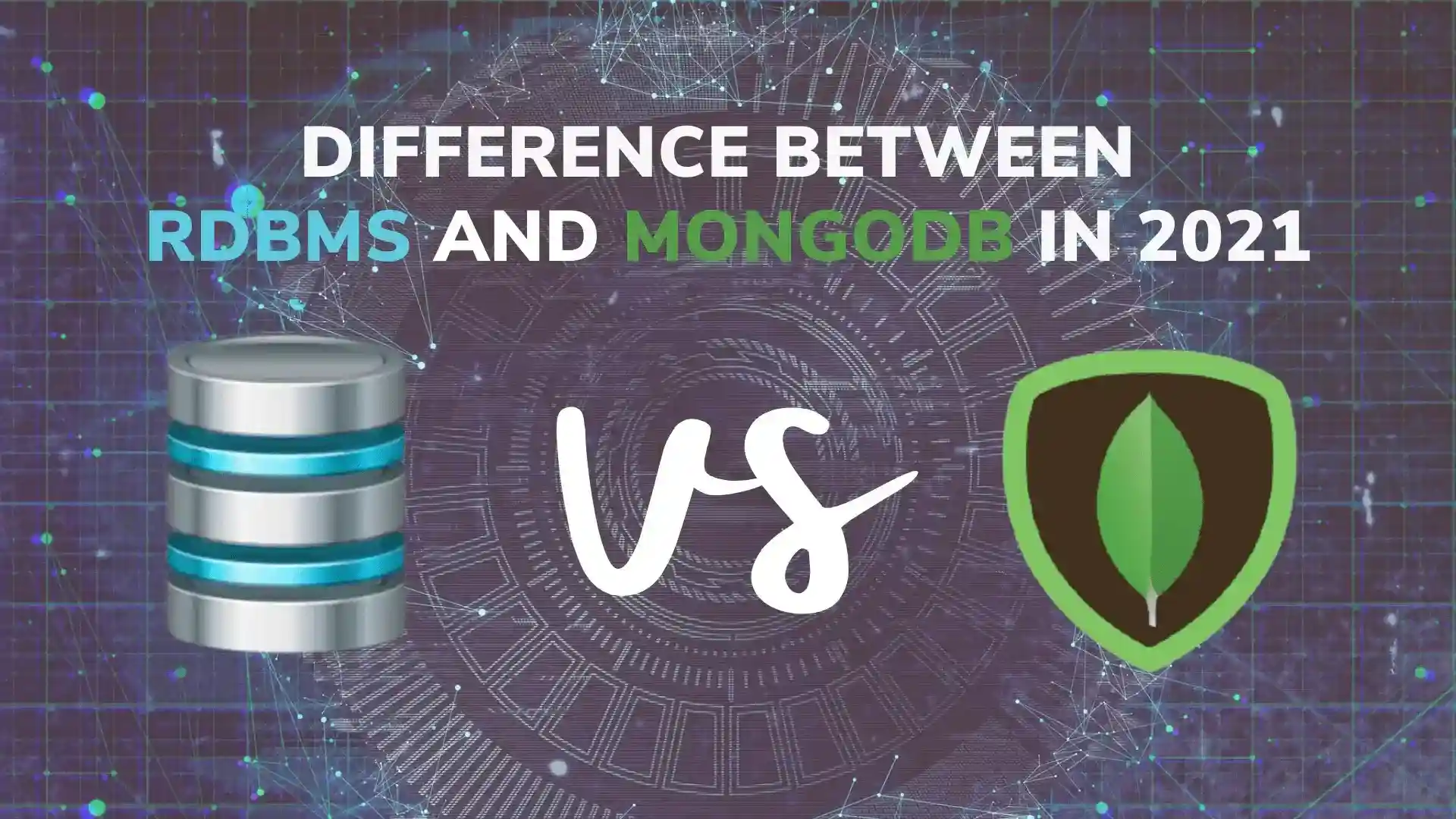This article is about comparing the difference between RDBMS and MongoDB technologies analyzes both database systems based on their essential characteristics.
What is RDBMS? Relational database management system and What is MongoDB? MongoDB is a NoSQL collection of servers that allow you to store, access, and share data in a database. It offers powerful queries over several fields and enables you to connect to data stored in other applications such as databases made for mobile devices or web APIs.
In addition, it provides an API so you can create your clients to access data from other applications. Finally, it supports many programming languages, including Java, Python, RDBMS standard interfaces, others, and SDLCs.
RDBMS and MongoDB are two of the most popular database technologies deployed globally. Above is a comparison table that shows how RDBMS compares with MongoDB.
RDBMS and MongoDB are the leading database technologies today. At Zidonuke, we offer a free comparison service to help you make tough choices. So contact us today to save time, money, and headaches.
For many organizations, the RDBMS and MongoDB database technologies
are synonymous with the word “database.” But use cases differ. RDBMS are great for companies that insist on having a robust consistency model, but use cases differ regarding document stores like MongoDB.
No matter what your need is for database technology, you have options. When it comes to beginner ranking or simple applications that operate on a smaller scale, RDBMS probably meets your demand best. However, suppose you want to get started with web applications quickly or plan to build an application for mobile devices. In that case, a document-oriented database like MongoDB might be your better choice.
In 2022, the most significant changes in database technology will come from how we store and manage data. RDBMS is the leading mainstream technology for storing and managing large-scale NoSQL databases. On the other hand, MongoDB is a young open-source project that aims to support similar feature sets for storing and managing structured data in a non-relational way.
This article looks at the main differences between RDBMS and MongoDB, why you might want one over the other, and how you can choose one today. Access to knowledge Never meet your customer face-to-face. Instead, always communicate through email, social media, or phone. Learn everything you can about your potential customers’ lives, desires, concerns, and fears so that you can better connect with them and make sure you take action.
Strength Of RDBMS
Dynamic diagram: As referenced, this gives you the adaptability to change your information pattern without altering any of your current information.
Scalability: MongoDB is on a level plane adaptable, which decreases the responsibility and scales your business effortlessly.
Sensibility: The data set doesn’t need a data set chairperson. Since it is decently easy to use like this, it may be utilized by the two engineers and presiding officers.
Speed: It’s high-performing for basic inquiries.
Flexibility: You can include new segments or fields MongoDB without influencing existing lines or application execution.
Strength Of Mongodb
Dynamic mapping: As referenced, this gives you the adaptability to change your information diagram without altering any of your current information.
Scalability: MongoDB is evenly adaptable, which decreases the responsibility and scales your business effortlessly.
Sensibility: The information base doesn’t need a data set executive. Since it is decently easy to understand like this, it may be utilized by the two designers and heads.
Speed: It’s high-performing for basic questions.
Adaptability: You can include new segments or fields MongoDB without influencing existing columns or application execution.

Advantages of RDBMS
- RDBMS is Cost-effective
- RDBMS is Relational
- RDBMS is ACID-compliant
- RDBMS is Object-Oriented
- RDBMS is Readable by Humans
- The relational database management system implements a relational object model usually implemented as a relational database management system (RMS).
- Each RDBMS system is different, but it generally follows the same architecture and uses the same programming models.
- The primary objects used by an RDBMS are tables, views, and triggers.
- A table in an RDBMS can have any structure depending on the type of data it contains. For example, there can be primary keys, foreign keys, storage.
Disadvantages of RDBMS
- Managing multiple databases and keeping them all connected is difficult.
- You will need to purchase and maintain backups of any sensitive data stored in these databases.
- Only those with administrative access to the server can access the central database, and even those with that access need to sign off on every change before it takes effect.
- MySQL is an open-source distributed database system, developed initially by MySQL LLC., that is used by many major websites and e-commerce sites around the world.
Advantages of MongoDB
- MongoDB is Customizable
- MongoDB is Scalable
- MongoDB is API-based
- MongoDB is a tool created by our developer’s friends, so you’re never alone, even when you’re done coding.
- It’s open-source and free to use, so you can check out all the code and build your tools.
- And unlike other online services, you don’t need to be rooted or have an internet connection to use it – though there are some reasons you might want to be root still.
Disadvantages of MongoDB
- MongoDB is a parallel query language and NoSQL database from the same MIT laboratory as Hadoop (the database created by MapReduce).
- Like Hadoop, it stores data in clusters. Still, unlike Hadoop, it keeps track of each piece of data separately and provides easy read and write access to individual pieces of data without copying files between venues.
- It supports a variety of file types, including CSV, XLS, JSON, and YAML. It has support for many everyday file operations, including insert, update, remove, and prominent.
- Several integration points with other open-source software such as ElasticSearch and Solr, making it easy to use, including some of the most common searches for databases across different platforms.
Ending Up:-
The article explains the difference and strength of MongoDB and RDBMS, and I hope it will help everyone understand it.


